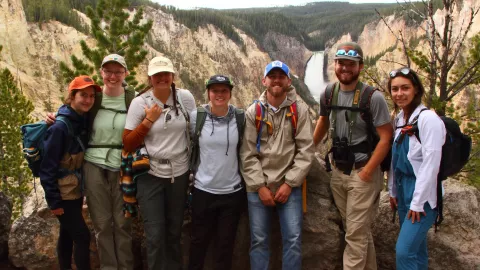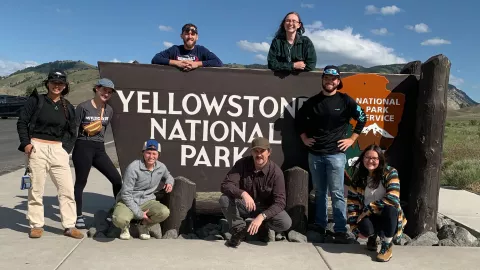Cox Lab
FOR 550 U.S. Biodiversity Hotspots
Dr. John Cox and his students traveled to Yellowstone National Park to learn more about this unique ecosystem in the class FOR 550: U.S. Biodiversity Hotspots. Yellowstone is just one in a series of locations that students visit in this travel-based experiential course.

Spring 2023

Spring 2023
Current Major Research Project Status
- Population Dynamics and Resource Selection of Reintroduced Elk in Kentucky (data collection/publication)
- Chronic Wasting Disease Susceptibility of Wild Cervids in Kentucky (data collection)
- Population Status of Mountain Lions in the White Mountains of Arizona (data collection)
- Ecology of the Martial Eagle in the Mara Region of Kenya (analysis/publication phase)
- Avifaunal response to urban reforestation and wetland construction (fieldwork/analyses)
- Impact of Timber Harvest Breeding Birds in a Mixed-mesophytic Forest (early publication phase, long-term fieldwork/analyses)
- Impacts of Fire, Herbivory, and Competition on select hardwood trees in the Inner Bluegrass Region of Kentucky (early publication phase, long-term data collection)
- Impacts of Herbivores on Select Tree Seedlings Replanted on Coal Surface Mines (long-term fieldwork)
Courses Taught
- FOR 101 Introduction to Wildlife Conservation (3 credit hrs, Spring)
- FOR 365 Wildlife Assessment (2 credit hrs, Spring)
- FOR 435 Conservation Biology (3 credit hrs, Spring; UK Global Dynamics Core)
- FOR 520 Mammals of the Eastern U.S. (4 credit hrs, Fall)
- FOR 550 U.S. Biodiversity Hotspots (3 credit hrs, Spring; field trip required;)
- FOR 599 Environmentalism: Survey of a Sociopolitical Movement (3 credit hrs)
- FOR 770 Ecology, Management, and Conservation seminar series: offerings have included Wild Canids, Wild Felids, Wild Ungulates of North America, and Neotropical Migrant Songbirds (1 credit hr)
- FOR 770 Where in the World is Aldo (Leopold)? (1 credit hr seminar)
